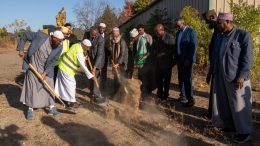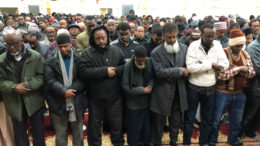With Somali, Arabic and English verse, artist brings global vision to Rochester arts walk
Ayub HajiOmar is one of two local artists chosen to incorporate art into the Discovery Walk in downtown Rochester. It’s the latest commission for the self-supporting artist. by Atra Mohamed In a world that is often intolerant of Islam, Ayub HajiOmar tries to build bridges. The Rochester resident describes himself as an “Islamic contemporary fine artist.” And he makes the Qu’ran a living document, incorporating scripture into paintings with detailed brushwork that captures the spirit of each verse. Ayub, 27, recently took on one of his largest commissions: choosing poems in English, Arabic and Somali to decorate giant benches on a four-block Discovery Walk in downtown Rochester near the Mayo Clinic. He worked with Rochester artist Sophia Chai to make 2nd Avenue S.W. an inviting space for pedestrians as part of the Destination Medical Center (DMC) initiative. Chai created the lighting and Ayub chose the poetry for the walk. The public commission was another stepping stone for Ayub, who received an emerging artist grant in 2019 and held an exhibition show at the Rochester Art Center the following year. The DMC has a process in place that engages the community in co-designing efforts, where community members, artists, and architectural designers are invited to …










